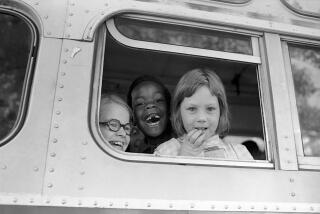After Thurgood Marshall, the Next Crusade for Howard Law Students : CAMPUS CORRESPONDENCE
WASHINGTON — Howard University School of Law lost a member of its family last week. U.S. Supreme Court Justice Thurgood Marshall, our law school’s proudest son, embodied Howard’s commitment to social justice. His death requires us to reflect on Marshall’s legacy and on how we can build on that legacy.
Howard Law students, like those at other law schools, come from a variety of backgrounds. Its graduates pursue the usual legal careers--public-interest attorneys, corporate counselors, prosecutors and public defenders, government officials and community activists.
Yet, there is something different about Howard Law students. That difference can be learned by asking them why they come here. Their answers can be summed up in one word--tradition.
It is a tradition simply and best defined by names--Charles Hamilton Houston, Marshall, William Hastie, Spottewood Robinson III. They are, of course, the more famous fighters for equality. The busts of Houston and Marshall in the halls of Howard Law remind us of all their struggles and achievements. But many other less renowned lawyers emerged from the school equally prepared to do battle for a more just society.
In the school’s corridors hang their portraits, members of graduating classes dating back to the late 1800s. In our two years here, we have often stopped to study their faces. Whether looking at J.S. Manning of Louisiana, class of 1912, or Vernon Jordan of Georgia, class of 1960, we see ourselves.
Ultimately, what this tradition means is that we are a family. Howard Law instills in us a sense of security and confidence that we can continue the legal work of those who have come before us. This is the privilege of being an heir to the Howard Law legacy. It is also the responsibility--striving to transform the law to construct a just society for all.
Marshall must have embraced that responsibility when he graduated and entered a nation controlled by Jim Crow. In a series of cases culminating in Brown vs. Board of Education, he effectively ended legalized segregation in the United States. His work as U.S. solicitor G eneral as well as a Supreme Court justice was a continuation of his fight for equality.
We must pick up that fight.
Our community has many plagues. There are more young, black males entering prison than entering the nation’s universities. The infant mortality rate of African-Americans in U.S. cities rivals that of Third World countries, testimony to the fundamental unfairness--and ruthlessness--at the heart of our health-care system. African-Americans too often live in environmentally blight communities. They still experience difficulty in getting loans to buy houses or start businesses.
Admittedly, these problems appear insurmountable. But we must remember that the issues faced by Marshall--forced segregation in schools, whites-only primary elections and racial housing covenants--must have appeared insurmountable to him as well. In the end, he defeated Jim Crow. We must summon a similar courage to confront the issues of our day.
Yet, we as future Howard Law graduates must not forget our responsibility to finish Marshall’s work. That his work is unfinished is underscored by the fact that although he ended legalized segregation in public schools, he was unsuccessful in his fight to bring about quality education for all. We remember Marshall’s dissent in San Antonio School District vs. Rodriguez, in which he denounced the Supreme Court’s “unsupportable acquiescence in a system which deprives children in their earliest years of the chance to reach their full potential as citizens . . . (pursuant to) a scheme which arbitrarily channels educational resources in accordance with the fortuity of the amount of taxable wealth within each district.”
The message Marshall delivered in his final visit to the law school during our first year still echoes in the halls: “Don’t stop fighting. Use Howard Law School as a stepping stone . . . a driving spirit in the battle for equality. Don’t slow down. If you do, they’ll run you over.”
Failure to heed these words will result in his heroic efforts being turned into a fleeting victory.
More to Read
Sign up for Essential California
The most important California stories and recommendations in your inbox every morning.
You may occasionally receive promotional content from the Los Angeles Times.










